World Cup: The top 10 matches世界杯:前10場比賽
- Brazil 2014 World Cup began on June 12
- 32 nations take part in tournament, which is held every four years
- Spain are the title holders following success in 2010
- Brazil has won the World Cup more than any other nation
Join the World Cup conversation at CNN Facebook Pulse
(CNN) -- The 2014 World Cup has barely begun, but already it's shaping up to be one of the best ever.
It's been hugely unpredictable, with not a single draw in 11 games which have produced 32 goals -- an average of nearly three a match.
Statistically the side that scores first usually goes on to win in football -- in Euro 2012 that happend over 70% of the time -- but unusually five teams that have conceded the initial goal have recovered to win their opening group games.
The Netherlands' 5-1 win over world champions Spain has been Brazil 2014's biggest shock so far, though Costa Rica's 3-1 victory over Uruguay was another major surprise.
With the tournament in full swing, CNN looks at 10 of the World Cup's greatest ever games.

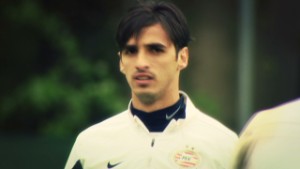
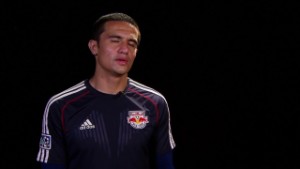
Brazil 2-3 Italy 1982
Billed as a battle between Brazil's irrepressible attack and Italy's miserly defense, this contest provided one of the most thrilling encounters in World Cup history.
Brazil, boasting the talent of Zico, Socrates and Falcao, was expected to bring home the trophy following a third place finish four years earlier.
Three World Cups victories between 1958 and 1970 had been the reward for Brazil's wonderfully entertaining and fluid style which had brought a whole new dimension to the game.
Against Italy, which had begun the tournament slowly, Brazil was faced with a side which had gained a confidence boosting win over Argentina to qualify for the second group stage.
And in Paolo Rossi, who had returned to the side following his involvement in a match-fixing scandal, Italy had a hero ready to emerge.
It was Rossi who gave his side a fifth minute lead, heading home Antonio Cabrini's cross.
The lead did not last long -- Socrates rounding off a one-two with Zico before firing home past Dino Zoff in the Italian goal.
But just as Brazil appeared set to take the game away from its opponents, Rossi punished a poor defensive mistake to restore Italy's advantage before the break.
Rossi should have finished the tie off midway through the second half but fired wide of the target -- a mistake which was punished almost immediately.
Falcao, a constant menace, unleashed a fierce drive which left Zoff with no chance.
Needing just a draw to progress, Brazil could have adopted a more cautious approach -- but that was not in this team's DNA.
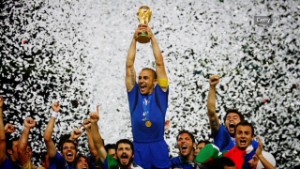
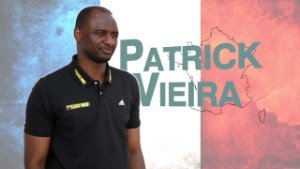
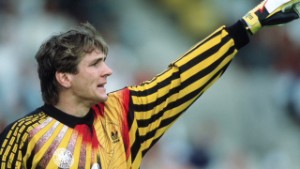
Brazil's refusal to abandon its principle of attacking football ultimately proved its downfall with 16 minutes remaining.
When Brazil failed to clear Bruno Conti's corner, Marco Tardelli's effort from the edge of the penalty area fell into the path of Rossi, who fired the ball home to claim his hat-trick.
Italy would go on to win the World Cup, defeating West Germany in the final with Rossi again on the scoresheet.
For Brazil, it was the day that its beautiful naivety was finally exposed -- a watershed moment in World Cup history.
West Germany 3-2 Hungary 1954
It is known as the "Miracle of Bern."
Hungary, a team which had revolutionized football and become the most feared on the planet, was supposed to cruise to World Cup glory.
Having progressed to the final following victories over Brazil and Uruguay, the reigning champion, Hungary was expected to brush aside a Germany side still getting to grips with the aftermath of World War II.
The two teams had already met in the group phase with Hungary triumphing 8-3 with the great Ferenc Puskas leading the side.
Hungary, unbeaten since 1950, boasted talents such as Nandor Hidegkuti and Zsoltan Czibor to assist the lethal Puskas.
Germany's presence in the final was far more a surprise given it had only played its first post-war game four years earlier.
Victories over Turkey, Yugoslavia and Austria helped it qualify for the final, which started in disastrous fashion.
Within the opening eight minutes, the Germans had already conceded twice with Puskas and Czibor making the early breakthrough.
The contest appeared done and dusted -- Hungary, unbeaten in four years, looked set to claim its very first World Cup title.
But Germany hit back. First, Max Morlock pulled a goal back before Helmut Rahn levelled the game at 2-2 in the 18th minute.
The game, played on a quagmire of a pitch, was an end-to-end affair but with six minutes remaining, the unthinkable happened -- Germany scored.
Rahn, the man who had drawn his side level, pounced to finish and win the World Cup for Germany.
"It was a kind of liberation for the Germans from all the things that weighed down upon them after the Second World War," German historian Joachim Fest wrote.
"July 4, 1954 is in certain aspects the founding day of the German Republic."
Italy 4-3 West Germany 1970
It was dubbed the "Game of the Century" but this seven-goal thriller was dangerously close to fizzling out into a laborious Italian victory.
Italy, who had taken an eighth minute lead through Roberto Boninsegna, looked certain to make the final having reached the 90th minute with its lead still intact.
The German side, which had defeated reigning champions England in the previous round in a grueling contest which went to extra-time, looked tired and forlorn.
Continually denied by the brilliance of Italian goalkeeper Enrico Albertosi, coupled with the referee's failure to award two penalties, Germany's frustration began to grow.
But just when it appeared Germany's hopes had been dashed, left-back Karl-Heinz Schnellinger -- who had played his club football in Italy since 1963 - scored a dramatic late equalizer.
That strike ensured the watching world would be treated to one of the most exciting periods of extra-time in tournament history.
What followed was a thrilling end-to-end affair with Germany striking first through Gerd Muller -- the man who had scored a hat-trick in the quarterfinal.
Italy responded through Tarcisio Burgnich's volley before Gianni Riva made it 3-2 with a stunning finish.
Germany wasn't finished though and Muller struck again with 10 minutes remaining to draw his side level.
But any thoughts of a German victory were finally extinguished when Gianni Rivera netted a dramatic winner.
Italy went on to play Brazil in the final four days later but proved no match for Pele and co. who cruised to a 4-1 victory to claim the trophy.
West Germany 3-3 France 1982
It remains one of the most iconic moments of World Cup history.
When France midfielder Patrick Battiston ran through on goal, he appeared set to score the goal which would send them into the World Cup final.
With the tie poised at 1-1, Battiston ran towards goal with glory beckoning with just the goalkeeper to beat.
But therein lay the problem. As Battiston forged his path towards goal, Harald 'Toni' Schumacher, turned his body and collided with the Frenchman running at full pelt.
Immediately knocked unconscious, Battiston lost two teeth, suffered three cracked ribs and damaged vertebrae. He failed to recover consciousness for 30 minutes.
While Battiston was left injured, the referee failed to award a free-kick nor caution Schumacher.
Instead, it was the goalkeeper, remembered as one of the tournament's most infamous villains, who helped his side qualify for the final.
Riled by the injustice, France took control of the game, moving into a 3-1 lead in the first half of extra-time.
Marius Trésor, the French sweeper, volleyed home the second before Alain Giresse appeared to have won the tie.
France, led by the talented Michel Platini and the impressive Jean Tigana, continued to fight for every ball with their opponent on the rack.
But with just minutes of the first half of extra time remaining, disaster struck.
France, having lost possession following a suspect looking challenge on Platini, were cut open and Karl-Heinz Rummenigge stabbed home.
Six minutes later, the comeback was completed when Klaus Fischer produced an exquisite bicycle kick to level.
Penalty kicks ensued and it was Schumacher who ensured his side progressed to the final -- saving from Didier Six and Maxime Bossis.
Informed after the contest that Battiston had lost two teeth, Schumacher commented: "If that's all that's wrong, tell him I'll pay for the crowns."
Following the tournament, a French newspaper ran a poll for the nation's least popular person -- Schumacher edged out Adolf Hitler to claim the dubious prize.
Netherlands 1-2 West Germany 1974
It was the dream final -- the host nation against the team playing one of the most beautiful brands of football ever seen.
The Netherlands, led by the mercurial Johan Cruyff, had qualified for the final following a campaign which had underlined its credentials as world champions.
Playing under the legendary Rinus Michels, Netherlands had already dispatched Argentina and Brazil and was favorite to defeat West Germany.
On July 7 1974, the men in orange kicked off the game -- and promptly took the lead within 63 seconds before a single German player had even managed to touch the ball.
Having kept possession so easily, Cruyff moved into the penalty area where he was fouled and Johan Neeskens smashed home the resulting penalty.
Speaking some time after the game, Netherlands midfielder Johnny Rep explained how that goal changed the entire complexion of the contest.
"We wanted to humiliate the Germans. It wasn't something we'd thought about, but we did it. We started knocking the ball around -- and we forgot to score a second."
The failure to convert dominance into goals soon cost the visiting side as West Germany leveled with a penalty of its own through Paul Breitner.
It was then left to the prolific striker, Gerd Muller, to win the tie two minutes before the interval.
While the orange shirts poured forward in search of an equalizer after the break, the German defense held firm.
In the end, the immovable object prevailed over the irresistible force.
"Going a goal down was good for us," German capain Franz Beckenbauer said after the game.
"The Dutch eased off and we were able to get into the match. And once you've relaxed your grip, it's hard to recover the initiative."
Four years later, Netherlands suffered final heartbreak once again, going down 3-1 to host nation Argentina.
Brazil 1-2 Uruguay 1950
If you're off to Brazil or already there, then heed this advice -- don't mention Alcides Ghiggia.
Some 64 years might have passed since Ghiggia's strike condemned Brazil to a heartbreaking defeat in the in the final but the scars remain.
"Our catastrophe, our Hiroshima," wrote novelist Nelson Rodrigues, "was the defeat by Uruguay in 1950."
Brazil, hosting the tournament for the first time, required just a draw from its final group game in a tournament where there was no 'final'.
The contest had begun well with winger Friaca giving the host nation a halftime lead.
With victory seemingly assured, Brazilian newspapers hit the street declaring glory, while the medals for the home side were pressed and a victory tune composed.
While nobody could accuse the authorities of not being organized, nobody managed to relate the news to Uruguay.
Instead, the visitors hit back after the interval through Juan Alberto Schiaffino before Ghiggia netted the winner.
Much of the blame fell on goalkeeper Moacyr Barbosa, who was held responsible for his side's defeat.
Some 20 years later, a woman in a supermarket pointed towards him and declared to the young boy by her side, "Look at him, son. He is the man that made all of Brazil cry."
"Under Brazilian law the maximum sentence is 30 years," Barbosa remarked on his 79th birthday, just two weeks before he passed away in 2000. "But my imprisonment has been for 50 years."
England 4-2 West Germany 1966
Was it or wasn't it?
Some 48 years, it's a question football fans are still asking.
When Geoff Hurst's effort bounced down on the goalline, the world held its breath.
With the final poised at 2-2 and in extra-time, the decision to allow the goal rested with a linesman from the USSR.
His decision to allow the effort went down in World Cup folklore and allowed England to go on and win the tournament.
Hurst completed his hat-trick late on in extra-time and complete a stunning victory.
In a pulsating contest, England fell behind to a Helmut Haller strike after just 12 minutes before Hurst leveled soon after.
The host nation then appeared to have snatched victory on 78 minutes when Martin Peters rifled home to send the 93,000 crowd into raptures.
But with 15 seconds remaining, the visitors hit back when Wolfgang Weber scored a dramatic equalizer.
With the scores at 2-2 at the end of 90 minutes, it was then that England manager, Alf Ramsey, coined his iconic phrase.
Having watched his players squander their advantage so late in the game, he told them: "You've won it once now go out and win it again."
And that's exactly what they did -- Hurst's two goals claiming the trophy for the first and so far only time in the nation's history.
Romania 3-2 Argentina 1994
After losing to West Germany in the final four years earlier, Argentina arrived in the U.S. hoping to reclaim the crown it had won in 1986.
A second round knockout meeting with Romania was expected to be negotiated comfortably enough, despite their opponents boasting the talents of captain Gheorge Hagi.
Without their own maestro, Diego Maradona, who was sent home from the tournament in disgrace for failing a drug test for ephedrine, the Argentina side relied on the striking prowess of Gabriel Batistuta and Abel Balbo.
The likes of Fernando Redondo and Diego Simeone ruled the midfield while Ariel Ortega was the new kid on the block hoping to announce himself on the world stage.
In soaring temperatures at California's Pasadena Rose Bowl, it was Romania which made the perfect start when Ilie Dumitrescu's looping free-kick inexplicably sailed over the head of Argentina goalkeeper Luis Islas and into the far corner.
That advantage lasted just five minutes before Batistuta was adjudged to have been fouled inside the penalty area and the forward picked himself up before firing home the spot kick.
If that was the signal for Argentina to go on and dominate then Romania failed to get the message.
Instead, it was Hagi who began to take control and his wonderful pass allowed Dumitrescu to run in front of the Argentina defense and finish exquisitely.
Hagi then extended Romania's lead 13 minutes after the interval, rounding off a stylish counter-attack by firing an unstoppable effort past Islas.
Argentina scrambled a goal back with 15 minutes remaining but Romania held on to clinch a place in the quarterfinals.
A 2-2 draw with Sweden meant the game went to penalties and misses by Dan Petrescu and Miodrag Belodedici saw Romani exit in heartbreaking fashion.
North Korea 3-5 Portugal 1966
North Korea arrived in England just happy to be involved in the World Cup.
A 3-0 defeat by the USSR in its opening game came as little surprise -- but what followed next was to go down in World Cup history.
Having drawn 1-1 with Chile in its second game, North Korea faced two-time world champions Italy at Middlesbrough's Ayresome Park.
Italy was expected to reach the later stages of the tournament and challenge for a third crow -- but that mission was cut short in stunning style.
Pak-Do-Ik's 42nd minute strike gave North Korea a 1-0 victory and set up a quarterfinal tie with Portugal.
Portugal, led by its supremely talented striker Eusebio, had cantered into the last eight by winning all three group games.
Huge favorites to progress to the semifinals, Portugal arrived at Everton's Goodison Park with the expectation it would win easily.
What transpired, however, was very different.
Pak Seung-Zin smashed in the opener shortly after kickoff, and further goals from Li Dong-Woon and Yang Sung-Kook put the minnow 3-0 ahead within the opening 25 minutes.
Fortunately for Portugal, Eusebio, who starred for the great Benfica side of the 1960s, hit back with four goals of his own before Jose Augusto sealed the victory.
There was no escape in the next round though for Portugal, which was beaten 2-1 by eventual winners, England.
Argentina 2-2 England 1998
This contest had everything -- goals, a red card, a dramatically disallowed 'winner' and England's predictable exit via penalties.
Argentina's and England's World Cup rivalry is well documented and stretches back to 1986 when Diego Maradona scored the 'Hand of God' goal.
Fast forward 12 years and the two teams met again, this time in the last 16 in Saint Etienne, France.
It was a frenetic encounter with Argentina taking the lead after just five minutes after Gabriel Batistuta netted from the penalty spot following a foul on Diego Simeone.
England leveled four minutes later when Michael Owen was fouled inside the penalty box and Alan Shearer fired home the spot kick.
Then came one of the most astonishing moments in recent tournament history.
Owen, just 18, picked up the ball on the halfway line, running at full force through the Argentina defense, before skipping past a couple of defenders and rifling the ball into the top corner.
England appeared to take a 2-1 lead into the interval but a clever free kick allowed Javier Zanetti to equalize in stoppage time.
The second half was barely two minutes old when the entire tie was turned on its head.
David Beckham the pin-up boy of English football, was shown a red card by Danish referee Kim Milton Nielsen after kicking out at Simeone.
Beckham's absence left England facing an uphill battle -- but one which it thought it had won when Sol Campbell headed home from close-range.
While England's players celebrated seemingly unaware that the goal had been disallowed for a foul, Argentina rushed up the field and almost grabbed the lead much to the frustration of Glenn Hoddle's men.
With neither side able to find another goal, the tie went to penalty kicks and it was Argentina which prevailed.
Their players celebrated into the night, even taunting their English opponents from their bus. It was a night which neither set of players would ever forget.
- 巴西2014年世界杯開始6月12日
- 32個國家參加比賽,這是每四年舉辦一次
- 西班牙是繼2010年成功衛冕冠軍
- 巴西奪得世界杯冠軍超過其他任何國家
(CNN) -在2014年世界杯才剛剛開始,但已經它的形成是有史以來最好的之一。
它取得了巨大的不可預測的,有沒有一個單一的平局中,產生了32球11場比賽 - 平均近三個匹配。
統計學的一面,得分第一通常去贏得足球 - 在happend的時間超過70%的2012歐洲杯 - 但異常已經承認了最初的目標五支球隊已經恢復贏得首場小組賽。
荷蘭5-1大勝世界冠軍西班牙隊一直是2014年巴西最大的衝擊,到目前為止,雖然哥斯達黎加3-1戰勝烏拉圭的又一重大驚喜。
隨著如火如荼的比賽,CNN看10世界杯有史以來最偉大的遊戲。



巴西2-3意大利1982
號稱巴西擋不住的攻擊和意大利的吝嗇防守之間的較量,本次比賽提供了在世界杯歷史上最驚心動魄的遭遇之一。
巴西,擁有濟科,蘇格拉底和法爾考的人才,預計將帶回家的戰利品以下季軍四年前完成。
1958年和1970年之間的三屆世界杯的勝利一直是獎勵巴西的奇妙有趣的和流體的風格,帶來了一個全新的維度來進行遊戲。
對陣意大利,這已經開始了緩慢的比賽,巴西面臨著其已經獲得了信心,提高戰勝阿根廷晉級第二階段小組賽的一側。
和保羅·羅西,誰跟隨他在假球醜聞捲入回到了身邊,意大利發生了一場英雄隨時出現。
這是羅西是誰給了他身邊的第五分鐘取得領先,回家安東尼奧·卡布里尼的十字架。
領頭的沒有持續多久 - 蘇格拉底四捨五入一兩次與濟科射擊家裡過去佐夫在意大利的目標之前。
但正如巴西似乎設置才能在遊戲遠離它的對手,羅西懲罰一個貧窮的防守失誤在中場休息前,恢復意大利的優勢。
羅西應該已經完成了領帶關閉中途下半年發射,但在廣泛的目標 - 這幾乎立刻受到懲罰的錯誤。
法爾考,一個恆定的威脅,發動了一場激烈的驅動器留下佐夫沒有機會了。
孤男寡女只是一場平局的進步,巴西也採取了較為謹慎的態度 - 但是,這不是在這支球隊的DNA。



巴西拒絕放棄攻勢足球的原則,最終證明了它的垮台與剩下的16分鐘。
當巴西未能明確布魯諾孔蒂的角落裡,馬可塔爾德利的從禁區邊緣的努力陷入了羅西,是誰開的球回家的路,聲稱他的帽子戲法。
意大利將繼續贏得世界杯,在scoresheet上再次擊敗西德隊在決賽中與羅西。
對於巴西,這是一天,它的美麗天真終於暴露 - 在世界杯歷史上的一個分水嶺。
西德3-2匈牙利1954年
它被稱為“伯爾尼奇蹟”。
匈牙利,一個團隊,已經徹底改變了足球,成為最令人畏懼的這個星球上,本來是要巡航世界杯的榮耀。
已進展到最後的下戰勝巴西和烏拉圭,衛冕冠軍,匈牙利預計一邊刷一邊德國仍然掌握在第二次世界大戰的後果。
兩隊已經滿足了小組賽階段與匈牙利8-3戰勝與偉大的普斯卡什領先的一側。
匈牙利,自1950年以來保持不敗,吹噓人才如Nandor Hidegkuti和Zsoltan Czibor協助致命的普斯卡什。
德國的存在,在最後的是更加賦予它只是起到了戰後第一場比賽四年前一個驚喜。
戰勝土耳其,南斯拉夫和奧地利幫助它晉級決賽,這在災難性的時裝起家。
在開幕八分鐘,德國人已經與普斯卡什和Czibor使得突破前期承認兩次。
這次比賽出現塵埃落定 - 匈牙利不敗四年來,看著設置要求它的第一個世界杯冠軍。
但德國回擊。首先,最大莫洛克拉到一個目標之前,赫爾穆特·拉恩扳平比賽在2-2在第18分鐘。
本場比賽,演奏的間距的泥潭,是一個終端到終端的事,但與其餘六分鐘,不可思議的事情發生 - 德國拿下。
拉恩,誰曾提請他身邊級別的男人,撲上去完成,並贏得世界杯的德國。
“這是一種解放從所有的事情,在他們壓低了第二次世界大戰後的德國,”德國歷史學家約阿希姆巨星寫道。
“1954年7月4日是在某些方面的德意志共和國的開國紀念日。”
意大利4-3西德1970
它被戲稱為“世紀博弈”,但是這七目標驚悚片是危險地接近fizzling出到一個艱苦的意大利的勝利。
意大利,誰通過羅伯托博寧塞尼亞採取了第八分鐘取得領先,看起來無疑使最終已經達到第90分鐘與它的主角仍然完好無損。
德國方面,它擊敗了衛冕冠軍英格蘭隊在上一輪在艱苦的比賽哪去了加時,顯得疲憊和孤獨的。
由意大利門將恩里科Albertosi,再加上裁判的不獎兩個點球的輝煌不斷否認,德國的無奈開始增長。
但是,僅僅當它出現德國的希望已經破滅,左後衛卡爾 - 海因茨·Schnellinger - 誰自1963年以來已經打出了自己的足球俱樂部在意大利 - 拿下了戲劇性扳平。
罷工保證了觀看世界將被視為對額外時間在比賽歷史上最令人興奮的時期之一。
隨之而來的是一場驚心動魄的終端到終端的事理與德國醒目首先通過穆勒 - 誰曾在四分之一決賽中打進了帽子戲法的人。
意大利通過塔西西奧Burgnich的凌空回應前詹尼·里瓦使它3-2有驚人的光潔度。
德國還沒有完,雖然和穆勒再次來襲剩餘畫出他的身邊級別10分鐘。
但德國的勝利有什麼想法最終被撲滅時,里維拉拘捕一個戲劇性的贏家。
意大利接著後來玩巴西隊在最後四天,但事實證明敵不過貝利和合作。誰戰罷以4-1勝利要求的獎杯。
西 德國3-3法國1982
它仍然是世界杯歷史上最具標誌性的時刻之一。
當法國中場帕特里克·巴蒂斯通的目標跑過,他出現設定的得分將這些請求進入世界杯決賽的目標。
隨著準備在1-1平手,巴蒂斯通跑向與剛剛門將榮耀招手打的目標。
但其中打好問題。隨著巴蒂斯通偽造了他對目標的路徑,哈拉爾'托尼'舒馬赫,轉過身體,並在全毛皮相撞的法國人跑。
立即砸暈,巴蒂斯通失去了兩顆牙齒,遭遇三裂肋骨和椎骨受損。他沒有恢復知覺30分鐘。
雖然巴蒂斯通被留下受傷,裁判沒有判給一個任意球,也不謹慎舒馬赫。
相反,它是門將,記住作為本次比賽的最臭名昭著的惡棍,誰幫助他的身邊晉級決賽之一。
受不公激怒,法國接管了比賽的控制權,正在步入一個3-1領先,第一個加時的一半。
馬呂斯璀璨香水,法國清掃車,凌空抽射回家的前一秒阿蘭·吉雷瑟似乎已經贏得了領帶。
法國為首的才華普拉蒂尼和令人印象深刻的蒂加納,繼續為每一個球與他們的機架上的對手進行戰鬥。
但短短幾分鐘內第一的剩餘額外時間的一半,災難降臨了。
法國,失去了藏在下面的普拉蒂尼嫌疑人尋找挑戰,被切開和魯梅尼格刺傷回家。
六分鐘後,當克勞斯·菲舍爾製作一個精緻的自行車踢水平復出完成。
點球隨之而來,這是舒馬赫誰保證他的身邊進展到最後的 - 從節約迪迪埃六及馬克西姆Bossis。
那巴蒂斯通已經失去了兩顆牙齒的較量後獲悉,舒馬赫說:“如果這一切說的不對,告訴他我會賠償冠。”
下面的比賽,法國一家報紙跑了投票為全美最不受歡迎的人 - 舒馬赫惜敗希特勒要求的可疑獎。
荷蘭1-2西德1974
這是最終的夢想 - 對球隊打見過的最漂亮的足球品牌之一的主辦國。
荷蘭為首的善變克魯伊夫,有決賽資格以下的運動而強調了其作為世界冠軍的憑據。
根據傳說米歇爾斯打,荷蘭已經派出阿根廷和巴西是最有希望擊敗西德。
7月7日1974年,男性在橙色拉開序幕遊戲 - 並及時採取了引線63秒內前一個德國球員甚至設法觸球。
經不斷佔有這麼容易,克魯伊夫移動到了禁區,他被犯規和約翰·內斯肯斯砸了家裡得到的懲罰。
說到遊戲一段時間後,荷蘭中場約翰尼代表解釋如何實現這一目標改變了比賽的整個膚色。
“我們想羞辱德國人這是不是我們有想過,但我們做到了,我們開始四處敲球 - 。我們忘了得分第二”
未能轉換的優勢轉化為進球很快就花了來訪的一面,西德平整,它自己的懲罰,通過布萊特納。
這在當時留下來的高產射手,穆勒,前兩分鐘的間隔贏得了領帶。
而橙色的襯衫向前倒在尋找一個均衡的休息後,德國的防守保持堅挺。
最後,在固定的物體上戰勝了不可抗拒的力量。
“走出去向下一個目標是為我們好,”賽后德國capain貝肯鮑爾說。
“荷蘭雨勢減弱,我們能夠進入比賽。而一旦你放鬆你的抓地力,這是很難恢復的主動權。”
四年後,荷蘭遭遇最終心碎再次下降3-1主辦國阿根廷。
巴西1-2烏拉圭1950
如果你就要去巴西或者已經存在,然後聽從這個建議 - 不提阿爾西德斯Ghiggia。
有些64年可能已經過去了,因為Ghiggia罷工譴責巴西到一個令人心碎的失利中在最後,但傷疤依然存在。
“我們的災難,我們的廣島,寫道:”小說家納爾遜·羅德里格斯,“是由烏拉圭在1950年的失敗。”
巴西,主持比賽的第一次,從比賽那裡沒有“最終”的最後一場小組賽中只需要一場平局。
本次大賽已與邊鋒Friaca給東道主一個領先結束上半場比賽開始很好。
勝利看似放心,巴西報紙傳遍大街小巷聲明榮耀,而金牌為家邊被壓和勝利曲調組成。
雖然沒有人能指責不被組織的主管部門,沒有人設法與新聞烏拉圭。
相反,客隊反擊的時間間隔後,通過胡安阿爾貝托·菲諾前Ghiggia落網的贏家。
遠之則怨的落在門將Moacyr巴博薩,誰負責他身邊的失利。
大約20年後,一名女子在超市指著朝他並宣布向小男孩在她身邊,“你看他,兒子,他是向所有巴西哭的人。”
“根據巴西法律的最高刑期為30年,”巴博薩說,他79歲生日,就在兩個星期前,他去世於2000年。“但我入獄已50年。”
英格蘭4-2西德1966
是它還是不是呢?
約48年來,這是一個問題的球迷都在問。
當傑夫·赫斯特的努力反彈向下goalline,世界屏住了呼吸。
隨著最後準備在2-2和在加時賽中,決定讓目標與休息從蘇聯巡邊員。
他決定讓工作去了世界杯民間傳說,並允許英格蘭去贏得比賽。
赫斯特完成了他的帽子戲法,尾盤在加時賽,並完成一個驚人的勝利。
在脈動比賽中,英格蘭落後的赫爾穆特·哈勒罷工只需12分鐘前後赫斯特扳平後不久。
東道主然後似乎已經搶走勝利第78分鐘的時候,馬丁·彼得斯線膛家送的93,000觀眾欣喜若狂。
但剩下的15秒,客隊打回來時,沃爾夫岡·韋伯取得了戲劇性的均衡器。
用分數在2-2在90分鐘結束,就在那時,英格蘭隊主教練,阿爾夫·拉姆齊,他創造標誌性的詞組。
看了他的球員們揮霍自己的優勢,以便在遊戲中後期,他告訴他們:“你贏了一次現在走出去,再次贏得它。”
而這正是他們做了什麼 - 赫斯特的兩個進球聲稱獎杯的第一個也是迄今唯一一次在國家的歷史。
羅馬尼亞3-2阿根廷1994
輸給西德隊在決賽四年前後,阿根廷抵達美國希望能收回冠,它已贏得了1986年。
預計與羅馬尼亞第二輪淘汰賽上進行談判舒舒服服,儘管他們的對手吹噓的隊長Gheorge萩人才。
沒有自己的藝術大師,馬拉多納,誰被送回家從恥辱的比賽未能麻黃素藥物測試,阿根廷側依靠巴蒂斯圖塔和巴爾博亞伯的驚人威力。
費爾南多·雷東多和西蒙尼的喜歡統治了中場,而阿里爾·奧爾特加是塊希望能公佈自己在世界舞台上的新的孩子。
在氣溫飆升在加利福尼亞州的帕薩迪納玫瑰碗,那是羅馬尼亞的取得完美開局時伊利耶杜米特雷斯庫的循環任意球莫名其妙地航行在阿根廷門將路易斯·馬爾的頭部和入遠角。
這種優勢持續了短短五分鐘之前,巴蒂斯圖塔被邊裁已經犯規在禁區內和前向上爬起來射擊回家的點球之前。
如果是這樣的信號阿根廷去和支配然後羅馬尼亞沒有得到消息。
相反,它是萩誰開始採取控制和他的允許杜米特雷斯庫在阿根廷的防守面前運行並完成精美的妙傳。
萩然後擴展羅馬尼亞的引線13分鐘的時間間隔後,四捨五入時尚的反擊被燒成過去馬爾一種不可阻擋的努力。
阿根廷炒一個目標,用剩下的15分鐘,但羅馬尼亞舉行,奪得在四分之一決賽的地方。
2-2戰平瑞典意味著比賽去懲罰而錯過了佩特雷斯庫和米奧德拉格Belodedici看到羅姆人出境的令人心碎的方式。
朝鮮3-5葡萄牙1966
朝鮮抵達英國只是很高興能參與世界杯。
3-0擊敗蘇聯在其首場比賽中來一點驚喜 - 但隨之而來的是旁邊在世界杯史冊。
經抽1-1與智利在其第二場比賽中,朝鮮面對兩屆世界冠軍意大利隊在米德爾斯堡的Ayresome公園。
意大利有望達到比賽和挑戰,第三個烏鴉的後期階段 - 但這一使命已經剪短超炫的風格。
樸待辦事項-IK的第42分鐘的進球給了朝鮮1-0勝利,建立了四分之一決賽領帶與葡萄牙。
葡萄牙的帶領下,它的超級天才前鋒尤西比奧,贏得所有三場小組比賽已經慢跑進入八強。
巨大的最愛進步到半決賽,葡萄牙來到埃弗頓的古迪遜公園與期望它會輕鬆取勝。
發生了什麼事情,然而,是非常不同的。
樸升尋砸了揭幕戰開球後不久,從李東垣,楊晟KOOK進一步目標將桃花魚3-0領先的開口內25分鐘。
幸運的是,葡萄牙,尤西比奧,誰出演20世紀60年代的偉大本菲卡方面,回擊用他自己的四個進球之前,何塞·奧古斯托密封了勝利。
有下一輪無處可逃雖然對葡萄牙,這是打2-1最終的冠軍,英格蘭。
阿根廷2-2英格蘭199 8
本次比賽擁有一切 - 目標,一張紅牌,一個大大不允許“贏家”和英格蘭的通過處罰預見的退出。
阿根廷和英格蘭的世界杯角逐是有據可查的,可以追溯到1986年,馬拉多納打進球門的“上帝之手”。
一晃12年,兩隊在聖艾蒂安,法國又見面了,這一次是在過去的16。
這是與阿根廷率先只需五分鐘後後點球下面就西蒙尼犯規巴蒂斯圖塔拘捕一個狂熱的遭遇。
英格蘭扳平四分鐘後,當歐文被犯規禁區內和阿蘭 - 希勒解僱回家的點球。
接著又是最令人驚訝的時刻,在最近的比賽歷史中的一個。
歐文,剛剛18,拿起球在中場線,在全部力量通過阿根廷的防守跑步,跳繩過去幾維護者和膛線將球頂入死角之前。
英格蘭似乎採取了2-1的領先優勢進入區間,但一個聰明的任意球讓薩內蒂在補時階段平衡。
下半年是僅兩分鐘之前,當整個帶子打開它的頭。
貝克漢姆英格蘭足球的迷人的男孩,被出示紅牌丹麥裁判金米爾頓尼爾森踢了西蒙尼在後。
貝克漢姆的缺席離開英國面臨著一場艱苦的戰鬥 - 但是它認為它已經贏得了當索爾·坎貝爾從近距離頭球破門。
雖然英格蘭球員慶祝似乎不知道他們的目的已經不允許犯規,阿根廷衝了上去領域,幾乎抓住了鉛多的霍德爾的人的無奈。
因為雙方都能夠找到另一個目標,領帶去了點球,這是阿根廷盛行。
他們的球員慶祝到深夜,甚至嘲笑他們的英語對手從他們的公共汽車。這是既不組球員將永遠不會忘記的夜晚。
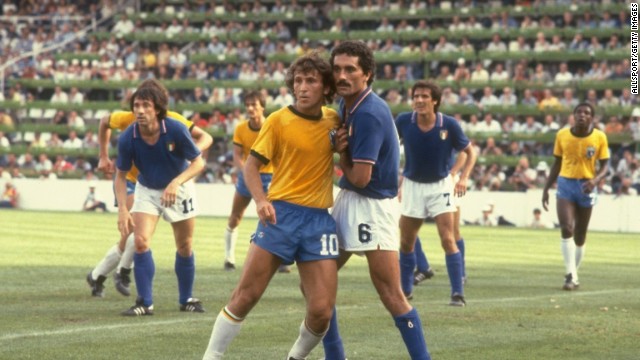 Italy's contest with Brazil at the 1982 World Cup is considered one of the greatest games in the tournament's history. A Paolo Rossi hat-trick ensured Italy won the second round match 3-2 and deprived Brazil a place in the semifinals. Instead, Italy went on to defeat West Germany 3-1 in the final with Rossi on target once again.
Italy's contest with Brazil at the 1982 World Cup is considered one of the greatest games in the tournament's history. A Paolo Rossi hat-trick ensured Italy won the second round match 3-2 and deprived Brazil a place in the semifinals. Instead, Italy went on to defeat West Germany 3-1 in the final with Rossi on target once again. 


 留言列表
留言列表
 {{ article.title }}
{{ article.title }}

